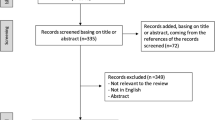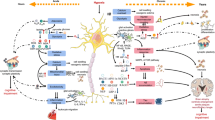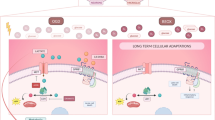Summary
In the present study, we examined the effect of oxygen glucose deprivation (OGD) post-conditioning (PostC) on neural cell apoptosis in OGD-PostC model and the protective effect on primary cortical neurons against OGD injury in vitro. Four-h OGD was induced by OGD by using a specialized and humidified chamber. To initiate OGD, culture medium was replaced with de-oxygenated and glucose-free extracellular solution-Locke’s medium. After OGD treatment for 4 h, cells were then allowed to recover for 6 h or 20 h. Then lactate dehydrogenase (LDH) release assay, Western blotting and flow cytometry were used to detect cell death, protein levels and apoptotic cells, respectively. For the PostC treatment, three cycles of 15-min OGD, followed by 15 min normal cultivation, were applied immediately after injurious 4-h OGD. Cells were then allowed to recover for 6 h or 20 h, and cell death was assessed by LDH release assay. Apoptotic cells were flow cytometrically evaluated after 4-h OGD, followed by re-oxygenation for 20 h (O4/R20). In addition, Western blotting was used to examine the expression of heat-shock protein 70 (HSP70), Bcl-2 and Bax. The ratio of Bcl-2 expression was (0.44±0.08)% and (0.76±0.10)%, and that of Bax expression was (0.51±0.05)% and (0.39±0.04)%, and that of HSP70 was (0.42±0.031)% and (0.72±0.045)% respectively in OGD group and PostC group. After O4/R6, the rate of neuron death in PostC group and OGD groups was (28.96±3.03)% and (37.02±4.47)%, respectively. Therefore, the PostC treatment could up-regulate the expression of HSP70 and Bcl-2, but down-regulate Bax expression. As compared with OGD group, OGD-induced neuron death and apoptosis were significantly decreased in PostC group (P<0.05). These findings suggest that PostC inhibited OGD-induced neuron death. This neuro-protective effect is likely achieved by anti-apoptotic mechanisms and is associated with over-expression of HSP70.
Similar content being viewed by others
References
Van Bel F, Groenendaal F. Long-term pharmacologic neuroprotection after birth asphyxia: Where do we stand? Neonatology, 2008,94(3):203–210
Zhao ZQ, Corvera JS, Halkos ME, et al. Inhibition of myocardial injury by ischemic postconditioning during reperfusion: comparison with ischemic preconditioning. Am J Physiol Heart Circ Physiol, 2003,285(2): H579–H588
Chavez JC, Hurko O, Barone FC, et al. Pharmacologic interventions for stroke: Looking beyond the thrombolysis time window into the penumbra with biomarkers, not a stopwatch. Stroke J Cereb Circ, 2009,40(10):e558–e563
Durukan A, Tatlisumak T. Preconditioning-induced ischemic tolerance: a window into endogenous gearing for cerebroprotection. Exp Transl Stroke Med, 2010,2(1):2
Bhuiyan MI, Kim YJ. Mechanisms and prospects of ischemic tolerance induced by cerebral preconditioning. Int Neurourol J, 2010,14(4):203–212
Lehotsky J, Burda J, Danielisova V, et al. Ischemic tolerance: the mechanisms of neuroprotective strategy. Anat Rec (Hoboken), 2009,292(12):2002–2012
Ferrara A, El Bejaoui S, Seyen S, et al. The usefulness of operant conditioning procedures to assess long-lasting deficits following transient focal ischemia in mice. Behav Brain Res, 2009,205(2):525–534
Stenzel-Poore MP, Stevens SL, King JS, et al. Preconditioning reprograms the response to ischemic injury and primes the emergence of unique endogenous neuroprotective phenotypes: a speculative synthesis. Stroke J Cereb Circ, 2007,38(2):680–685
Miao Y, Zhang W, Lin Y, et al. Neuroprotective effects of ischemic preconditioning on global brain ischemia through up-regulation of acid-sensing ion channel 2a. Int J Mol Sci, 2010,11(1):140–153
Xing B, Chen H, Zhang M, et al. Ischemic postconditioning inhibits apoptosis after focal cerebral ischemia/ reperfusion injury in the rat. Stroke J Cereb Circ, 2008,39(8):2362–2369
Hausenloy DJ, Yellon DM. Preconditioning and postconditioning: underlying mechanisms and clinical application. Atherosclerosis, 2009,204(2):334–341
Racay P. Ischaemia-induced protein ubiquitinylation is accompanied with heat-shock protein 70 expression after naïve and preconditioned ischaemia. Cell Mol Neurobiol, 2012,32(1):107–119
Sun XC, Xian XH, Li WB, et al. Activation of p38 MAPK participates in brain ischemic tolerance induced by limb ischemic preconditioning by up-regulating HSP 70. Exp Neurol, 2010,224(2):347–355
Wang X, Liu J, Zhu H, et al. Lo EH: Effects of neuroglobin overexpression on acute brain injury and long-term outcomes after focal cerebral ischemia. Stroke, 2008, 39(6):1869–1874
Prasad SS, Russell M, Nowakowska M. Neuroprotection induced in vitro by ischemic preconditioning and postconditioning: modulation of apoptosis and PI3K-Akt pathways. J Mol Neurosci, 2011,43(3):428–442
Tead LG, Gilmore RM, Bellolio MF, et al. Percutaneous clot removal devices in acute ischemic stroke: a systematic review and meta-analysis. Arch Neurol, 2008, 65(8):1024–1030
Aronowski J, Strong R, Grotta JC. Reperfusion injury: demonstration of brain damage produced by reperfusion after transient focal ischemia in rats. J Cereb Blood Flow Metab, 1997,17(10):1048–1056
Pignataro G, Meller R, Inoue K, et al. In vivo and in vitro characterization of a novel neuroprotective strategy for stroke: ischemic postconditioning. J Cereb Blood Flow, 2008,28(2):232–241
Longa EZ, Weinstein PR, Carlson S. Reversible middle cerebral artery occlusion without craniectomy in rats. Stroke, 1989,20(1):84–91
Tsang A, Hausenloy DJ, Mocanu MM. Postconditioning: a form of ‘modified reperfusion’ protects the myocardium by activating the phosphatidylinositol 3-kinase—Akt pathway. Circ Res, 2004,95(3):230–232
Sun HY, Wang NP, Halkos M. Postconditioning attenuates cardiomyocyte apoptosis via inhibition of JNK and p38 mitogen-activated protein kinase signaling pathways. Apoptosis, 2006,11(9):1583–1593
Kirino T. Ischemic tolerance. J Cereb Blood Flow Metab, 2002,22(11):1283–1296.
Tsuchiya D, Hong S, Matsumori Y. Overexpression of rat heat shock protein 70 is associated with reduction of early mitochondrial cytochrome c release and subsequent DNA fragmentation after permanent focal ischemia. J Cereb Blood Flow Metab, 2003,23(6):718–727
Adams JM, Cory S. The Bcl-2 protein family: arbiters of cell survival. Science, 1998,281(5381):1322–1326
Glantz LA, Gilmore JH, Lieberman JA, et al. Apoptotic mechanisms and the synaptic pathology of schizophrenia. Schizophr Res. 2006,81(1):47–63
Schellenberg B, Wang P, Keeble JA, et al. Bax exists in a dynamic equilibrium between the cytosol and mitochondria to control apoptotic priming. Mol Cell, 2013,49(5): 959–971
Author information
Authors and Affiliations
Corresponding author
Additional information
The two authors contributed equally to the project.
This project was supported by a grant from the Health Bureau of Henan Province, China (No. 201003111).
Rights and permissions
About this article
Cite this article
Zhao, Jh., Meng, Xl., Zhang, J. et al. Oxygen glucose deprivation post-conditioning protects cortical neurons against oxygen-glucose deprivation injury: Role of HSP70 and inhibition of apoptosis. J. Huazhong Univ. Sci. Technol. [Med. Sci.] 34, 18–22 (2014). https://doi.org/10.1007/s11596-014-1225-0
Received:
Revised:
Published:
Issue Date:
DOI: https://doi.org/10.1007/s11596-014-1225-0




